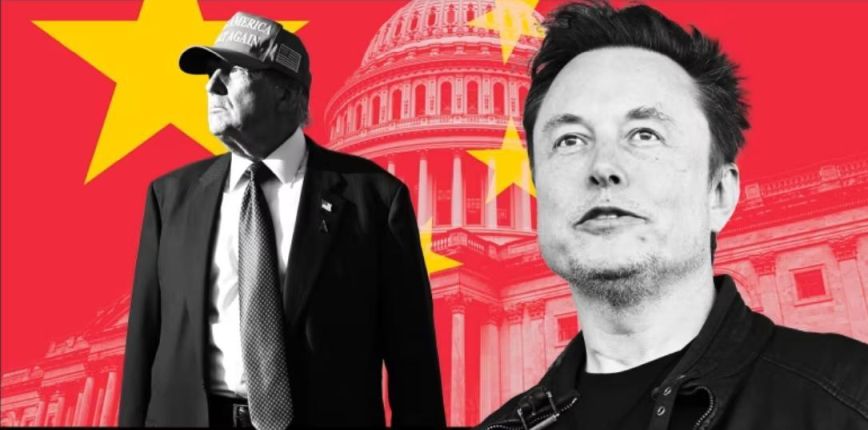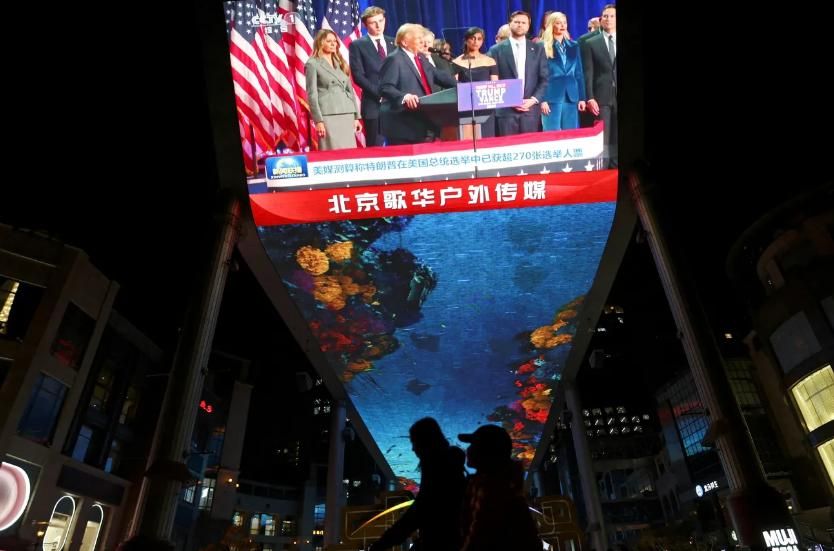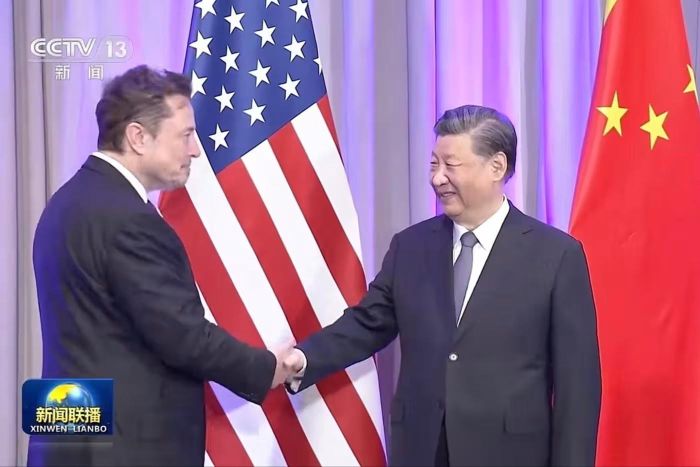By Eric Vandenbroeck and co-workers
Trump Has Assembled a Team of China Hawks.
How Will Beijing Respond?
US President-elect Donald
Trump’s proposed cabinet is stacked with so-called China hawks who have made
clear an ambition to confront America’s ascendant superpower rival in nearly
every policy realm, from the economy to security. But unlike at Trump’s
previous inauguration eight years ago, Chinese leaders may not be caught
off-guard by a more confrontational approach. Instead, experts say this time
around Beijing is more experienced in dealing with the transactional leader and
the ideological hardliners around him, and may seek to establish back-channels
through more China-friendly figures in Trump’s inner circle, such as Elon Musk.
Musk often echoes
some of Beijing’s talking points, such as maintaining a healthy “win-win”
economic relationship and even calling Taiwan an
integral part of China. The future success of a key Musk business like
Tesla could hinge on what course relations between the world’s two largest
economies take over the next four years.
The China Play
Early in the Biden
administration, senior officials got together, read the intelligence, and
concluded that the 2020s would be the decisive decade in U.S. competition with
China. Without corrective action, the United States faced a growing risk of
being surpassed by China technologically, dependent on it economically, and
defeated militarily in the South China Sea or the Taiwan Strait.
The new Trump team
will take the United States through the second half of the decisive decade.
There is much to be done. Trump’s national security picks, particularly Mike
Waltz as national security adviser, Marco Rubio as secretary of state, and
Elise Stefanik as ambassador to the United Nations, understand the task ahead
and have views consistent with a growing bipartisan consensus on the need to
outcompete China. Their most significant obstacle in carrying out a competitive
approach may be Trump’s penchant for dealmaking, transactionalism,
and flattery toward President Xi Jinping, which sometimes undercut his staff’s
more hardline approaches, including the expansion of export controls and a
vocal defense of human rights, among other measures, the first time around.
If Trump’s new team
can overcome that challenge, they will have an opportunity to improve America’s
competitive position. Closing the gap during the decisive decade may call for
building on the work of President Joe Biden, just as the Biden team built on
the work of the Trump administration. The Biden administration focused on
rebuilding American strength by focusing on its foundations at home and its
relationships with partners abroad, an approach summed up in its “invest,
align, compete” tagline. That formula can also serve as a way to fulfill the
Trump administration’s vision of “peace through strength.” But rebuilding
American power will require the Trump administration to undertake new efforts,
too, that depend on bipartisan congressional support and the buy-in of the
American public.

Strength Starts at Home
Some of the most
urgent questions about U.S. China policy turn on questions about domestic
policy, which provides the basis for American strength. But the foundations of
that strength have atrophied, especially since the end of the Cold War. The
administration will need to undertake significant structural reforms to remedy
these weaknesses.
The United States
needs to fix its defense industrial base to rapidly deter China and, if
necessary, defeat it in a potential conflict. At present, the United States
would expend all its munitions within a week of sustained fighting and would
struggle to rebuild surface vessels after they were sunk, with a national
shipbuilding capacity less than that of one of China’s larger shipyards. The
Trump administration must focus on making progress on two timelines: the
two-year problem of fielding more uncrewed systems and cruise and ballistic
missiles in the Indo-Pacific, as well as the five-to-ten-year problem of
revitalizing the United States’ shipbuilding industry, which has been declining
for decades without an adequate commercial sector to keep it viable.
Washington also needs
to protect its critical infrastructure from cyberattacks. China has compromised
U.S. critical infrastructure on which millions of Americans rely, including
water and gas, transportation, and telecommunications systems, to incite chaos,
sowing panic, and reducing U.S. will in a conflict scenario. As it invests in
offensive capabilities, the Trump administration will also need to bolster
American defenses through a combination of regulatory measures, new legislation
holding companies accountable for lackluster cyber defenses, and novel
technical efforts that can complicate the abilities of bad actors to penetrate
U.S. networks.
Finally, the United
States needs to invest in reindustrialization and technological leadership.
China already accounts for more than 30 percent of global manufacturing, can
innovate successfully, increasingly leads in the sectors of tomorrow, and is
redirecting massive amounts of capital into manufacturing as its housing market
stagnates. The result, a second “China shock” akin to the one that flooded U.S.
markets with cheap Chinese goods at the beginning of this century, will
threaten the United States’ future as an industrial power and leave it more
dependent on China than China is on the United States. Addressing this problem
will require not only tariffs but also industrial policies to stimulate
manufacturing and high-tech industry and coordination with allies
and partners. Punitive measures directed at allies, such as tariffs, will
complicate the United States’ ability to enlist them in efforts to protect
against China’s excess capacity.
To advance this
domestic agenda, the Trump administration cannot rely only on executive branch
authorities. It will need significant bipartisan congressional support. The
Biden administration approached some major domestic initiatives in this
fashion, including through its infrastructure bill and the CHIPS and Science
Act, and the Trump administration could do the same.
The Trump
administration will also need to mobilize the American public. Since the 9/11
attacks in 2001, every American president has given a primetime address from the
Oval Office on some aspect of Middle East policy. None have done so on China.
Trump may consider an address to the nation on China policy, but how he frames
the nature of the competition with China will matter more than whether he
delivers such a speech. With a clear-eyed but not demagogic tone, stressing
competition but not necessarily confrontation, and linking competition with
China directly to the interests of Americans, Trump could rally the American
public, civil society, academia, and the corporate sector behind the
administration’s efforts.
Footage of President-elect Donald Trump at a shopping
complex in Beijing, November 2024

For Beijing, after
years of ties with Washington at a historic low, the prospect of having an ally
like Musk influencing the White House is a definite positive. Henry Huiyao Wang, a former senior government official and the
founder and president of the Beijing-based Center for China and Globalization,
says that while Beijing is “preparing for the worst” there remains hope that
Trump, with the support of American billionaires like Musk, can be “more
pragmatic” and US-China tensions can be dialed back.
Threats, Bluffs, and Promises
Beijing, for its
part, is already taking steps to prepare for the incoming administration. It is
deeply concerned about Trump’s threat to levy 60 percent tariffs on Chinese
goods and has already signaled it is prepared to retaliate with tariffs, export
controls, and sanctions of its own, as well as crackdowns on U.S. companies
operating in China. If Chinese officials believe retaliation will provoke
further escalation from Trump, they may be restrained, mirroring their behavior
in the trade war during Trump’s first term. If they believe, however, that
retaliation may cause the Trump administration to back down for fear of rising
inflation or risks to key American companies, then they are more likely to
respond forcefully, perhaps even seeking to escalate to de-escalate, a tactic
previewed by Beijing in its targeting of Micron, an American semiconductor
manufacturer, and its recent use of export controls on rare earth elements in
response to U.S. export controls. But there is a third possibility: if Trump levies
a 60 percent tariff early in his presidency and shows limited interest in
negotiation, and China concludes that the risks to its economy (and Xi’s
reputation) are existential and intolerable, then Beijing may have no choice
but to respond forcefully, regardless of the expected American response.
It’s unclear whether
the Trump administration’s tariff threat is a negotiating tactic intended to
achieve a change in China’s behavior, a nonnegotiable U.S. policy intended to
achieve decoupling or a mix of both. For Beijing, the best outcome may be to hope
for the former and, through a mixture of retaliation and personal diplomacy,
push for a bargain that might include trade, technology, and even
counternarcotics measures. To increase the odds of such an outcome, Beijing may
initially retaliate against companies with close ties to Trump, including Elon
Musk’s Tesla, in order to incentivize de-escalation. Chinese officials may also
seek to split Trump from his more hard-line staff and
play to his direct self-interest, as they did in negotiations following the
start of the U.S.-Chinese trade war during his first term. Their strategy
resulted in Trump downplaying China’s crackdown against protesters in Hong
Kong, expressing support for its internment camps in Xinjiang, offering to lift
export controls on Huawei and ZTE, and even accepting a trade deal that did not
address China’s industrial policy practices. Given this history, the
possibility that Beijing suggests a grand bargain to Trump in which
semiconductor export controls and other would-be nonnegotiable U.S. policies,
potentially including U.S. Taiwan policy, are negotiated directly with Beijing
should particularly concern the administration’s more competitively inclined
staff. Such a proposal should be rejected.

Elon Musk with
Chinese leader Xi Jinping at a gala dinner in San Francisco in 2023. The
world’s richest man has deep connections to top Chinese Communist party
leaders
Musk’s business
empire sits across a minefield of possible conflicts on issues of national
security, tech competition, supply chains, and free speech, as well as the
future of Taiwan.
The world’s richest
man has deep connections to top Chinese Communist party leaders and is in the
middle of lobbying Beijing over important decisions for his $1tn electric
vehicle business, Tesla.
X owner Elon Musk spends a lot of time posting extreme
right-wing talking points and misinformation on his social media platform. But on the eve of
Election Day, shortly before NBC News projected Donald Trump's
re-election.
Musk posted a
pro-Trump video arguably more concerning than pretty much anything he’s shared
before. The video features messaging tied to
QAnon, one of the most noxious, brain-corroding conspiracy theories circulating
among the MAGA faithful. And, once again, one has to wonder how we’ve ended up
in a situation where a man with so much power believes such backward things.
Tesla has received
billions of dollars in cheap loans, subsidies, and tax breaks from the Chinese
government. The carmaker is highly dependent on its Shanghai factory, the
biggest in its global network, for not only selling to the country of 1.4bn
people but also exporting its China-made cars to other parts of the world.
Musk’s Chinese suppliers, especially in batteries, are also crucial to the
company’s global manufacturing operations, including in the US.
Musk believes his
pivot to autonomous driving and artificial intelligence could boost Tesla’s
market valuation as high as $5tn, five times higher than today. But he is also
racing against a clutch of rival Chinese carmakers and tech groups, from BYD, Xpeng, and Nio to Baidu, Xiaomi, and Huawei, who are all
developing similar.
Among Chinese
consumers, Tesla’s rapid global success coupled with an admiration for maverick
entrepreneurship has garnered Musk a cult following, and the nickname “the
Silicon Valley ironman”. He has met Xi, the powerful Chinese leader, at least
twice.
Yet among defense
officials in Beijing, Musk’s business empire poses several questions of
national security, placing Musk in conflict with the absolute priority of Xi
and his leadership.

The researchers
added: “Starshield satellites could undertake
kamikaze-style attacks on spacecraft and be equipped with weapons payloads to
carry out space strikes, posing threats to space security,” referring to the
version of the Starlink satellite network that is devoted to American national
security applications.
There are also signs
that Musk’s personal views clash with others in Trump’s close orbit who want
the US to push back harder against Beijing’s increased military assertiveness, including
over Taiwan.
Yaqiu
Wang, research director for China at Freedom House, says that Musk’s claim that
he is a “free speech absolutist”, made when he bought the social media platform
in 2022, has been proved a “complete sham” by his acceptance of Chinese
censorship and attacks on critics.
“It’s unclear whether
the Chinese government has requested account information of X users who express
critical views of the CCP and whether X has handed over such information. Given
Musk’s coziness with Beijing, his lack of principle on free speech and privacy
rights, and his penchant for authoritarian rule, this should be a concern,”
Wang says.
Ultimately, when it
comes to influencing Trump on China there will be a “jumble” of views competing
for the president’s ear, says Andrew Gilholm,
head of China analysis at consultancy Control Risks.
On the one hand,
there will still be traditional Wall Street titans and tech leaders who are
seen as Beijing-friendly and don’t want to rock the boat with China. And on the
other hand, there are hawks, such as Marco Rubio, who are ideologically
anti-China and want to hammer China on all fronts. And then there is Musk.
Musk is a wild card.
For updates click hompage here